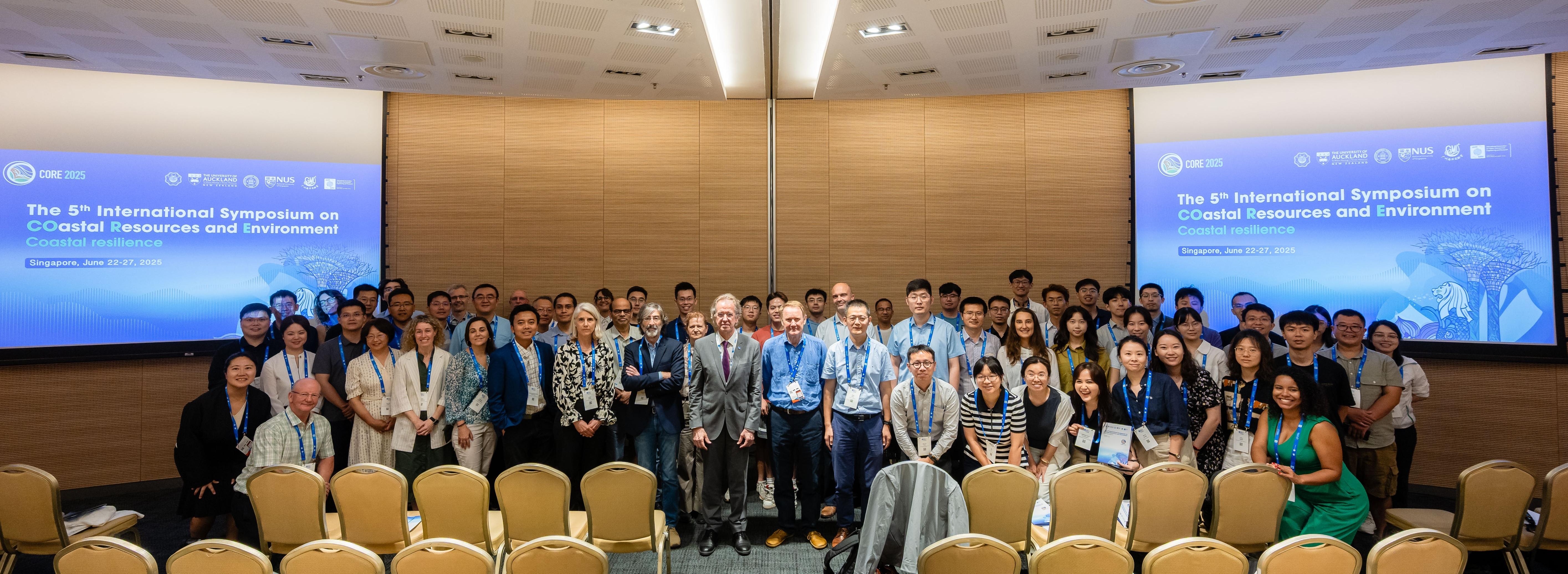The 5th International Symposium on Coastal Resources and Environment (CORE2025) was successfully convened in Singapore from June 22 to 27, 2025. Professor Philippe Gourbesville, President of the International Association for Hydro-Environment Engineering and Research (IAHR), and Professor Ian Townend, Fellow of the Royal Academy of Engineering (RAE), attended the event and delivered opening addresses.
In the keynote speech session, Associate Professor Mick van der Wegen from the International Institute for Hydraulic and Environmental Engineering, Delft University of Technology, Netherlands, delivered a presentation titled Exploring the Unknown: Sea Level Rise Impact on Estuarine Morphodynamics, highlighting the potential of long-term mathematical modeling in simulating estuarine morphodynamics under global climate change. Professor Guan Dawei from our university presented his latest research on Improving Coastal Structural Resilience: Scour Research for the Safety of Offshore Wind Farm Monopile Foundations, showcasing advancements in simulation techniques and resilience protection methods for offshore wind turbine foundations. Professor Maitane Olabarietta from the University of Florida, USA, addressed Extreme Storms and Their Far-Reaching Impacts: Forecasting Coastal Erosion, Water Quality, and Beyond, demonstrating through large-scale modeling and long-term field observations the comprehensive effects of storms on geomorphological evolution and ecosystem services in southern Florida. Professor Stijn Temmerman from the University of Antwerp, Belgium, presented Blue Carbon Accumulation in Salt Marsh Sediments in Response to Sea Level Rise, proposing that rising sea levels may enhance the carbon sequestration capacity of intertidal salt marshes.
The symposium featured nine parallel sessions and poster presentations, with a total of 55 presentations delivered. Experts and scholars engaged in in-depth discussions across six key themes, including Estuarine Hydrodynamics and Sediment Dynamics, Biophysical Interactions and Biomorphodynamics, Blue Carbon in Tidally Dominated Environments, Estuarine Systems as Climate Change Buffers, Sustainability of Human-Sea Coupled Coastal Wetland Systems, and Technological Advances with Nature-Based Solutions. Presentations explored critical topics including estuarine sediment transport, bio-geomorphological processes, coastal wetland blue carbon cycles, resilience enhancement strategies, and nature-based solutions. The latest advancements in applying big data and artificial intelligence to the simulation and evaluation of biophysical processes in estuarine and coastal environments were also showcased.
Built on the theme of Coastal Resilience, this symposium was co-hosted by Hohai University, the University of Auckland (New Zealand), Beijing Normal University, the National University of Singapore, Southern Marine Science and Engineering Guangdong Laboratory, and IAHR. The symposium brought together nearly 100 scholars and experts from over 10 countries and 30 research institutions. Professor Zhou Zeng from our university chaired the organizing committee.



